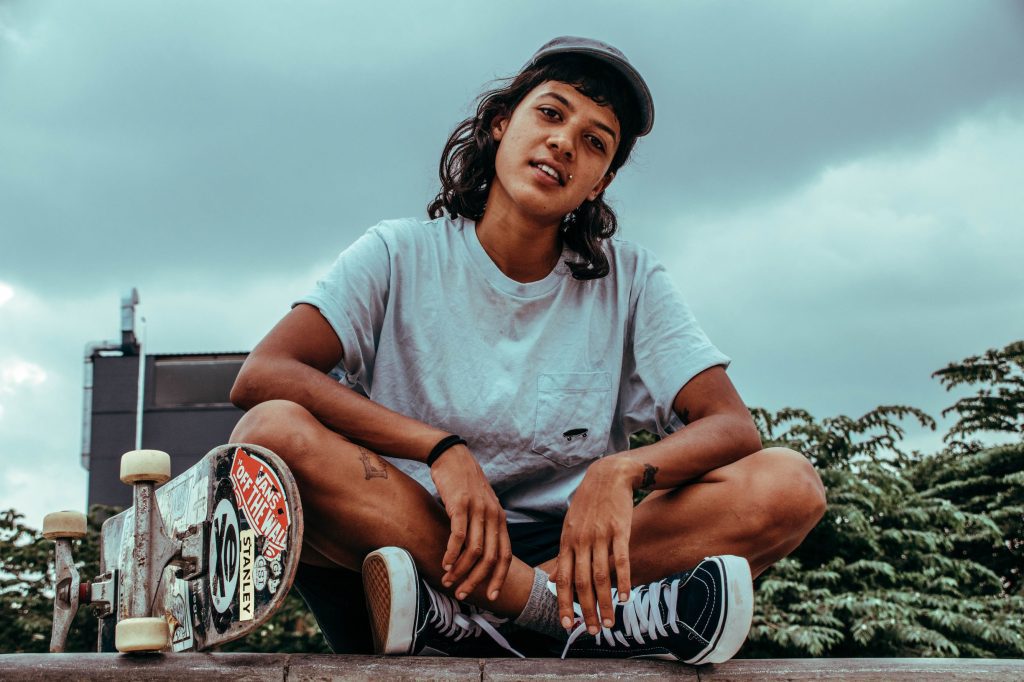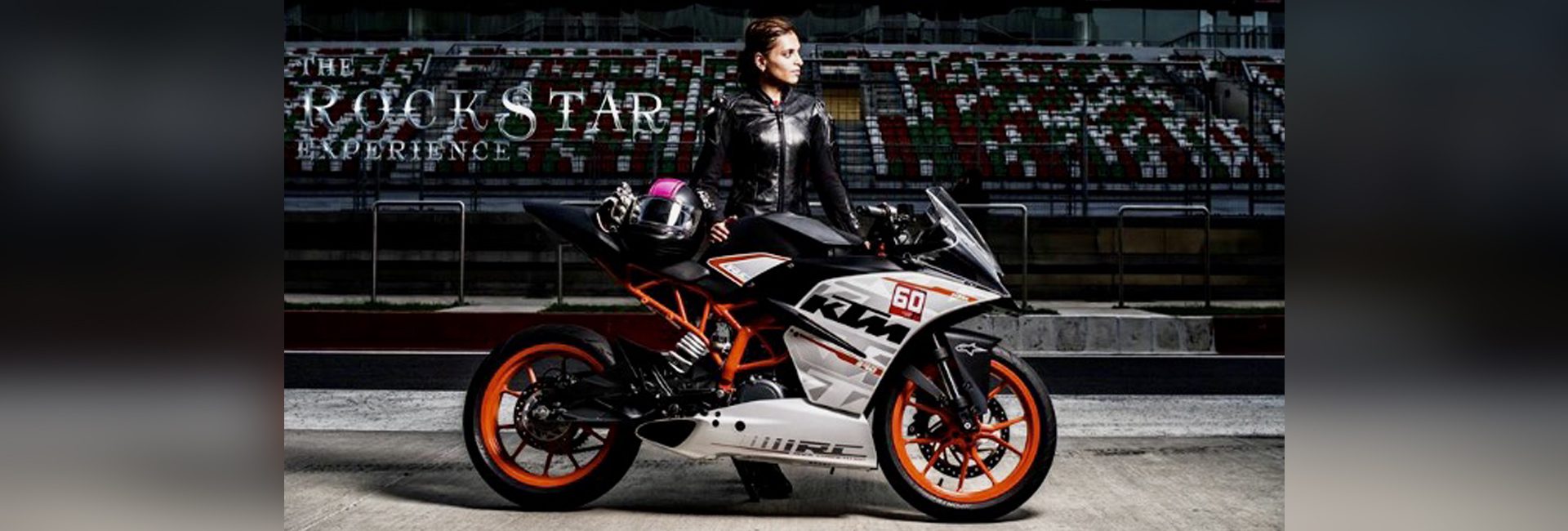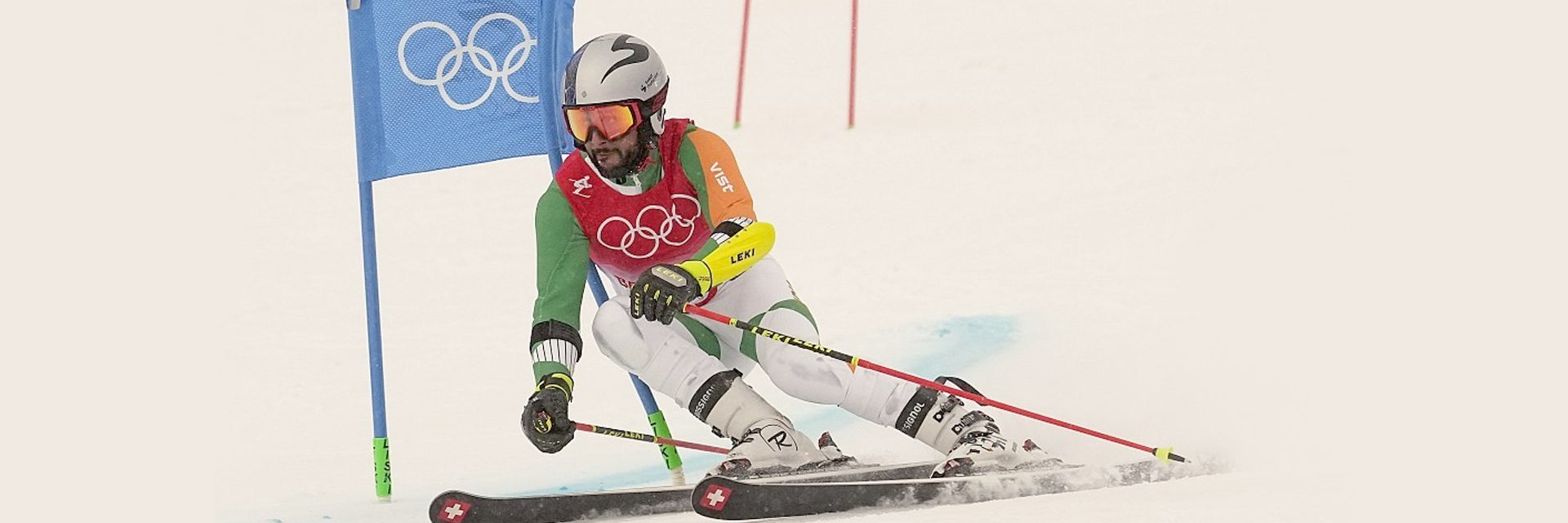(December 4, 2023) Atita Verghese was 19 when she got on a skateboard for the first time, on a whim. The spark she felt was instant, and very real – ten years later, it’s still burning bright. Atita Verghese, or ‘Atty’, as she is known to her friends, is India’s first female skateboarder. She turned a deaf ear when she was jeered at for being a girl, and if there was no infrastructure available, she helped build it with her own hands. When, for the longest time, she couldn’t afford her own board, she learned to make do by borrowing from the boys.
That’s how Atita went on to become part of a counterculture tsunami, as women around the world, clad in sarees, hijabs and baggy jeans, kickflipped and switched their way to freedom. She’s also the only skateboarder in the country to land a coveted Vans sponsorship (Vans is an American manufacturer of skateboarding shoes and apparel). This year, world class skateboarder Madars Apse featured her in an episode in Season 3 of Redbull’s State Tales, a documentary series “through skateboarding’s wilder shores.” That apart, she’s the founder of Girl Skate India, an organisation that works with young girls from poor families across India, using skateboarding as a means of helping them rise above their circumstances. She also travels the world – she was recently skateboarding in Moscow.

Atita Vergese
The counterculture crew
“There were like five, six skaters in the city (Bengaluru) when I first started, and not many more in the country,” Atita tells Global Indian. In those early days, the boys indulged the lone girl in their crew. “When they took a break they would let me have their skateboards,” she recalls. She and four others, including her friend Abhishek, who first introduced her to the sport, formed the Holy Stoked Collective and when he saw “how into it” she was, he bought Atita her first board, “all the way from the USA. I was stoked,” she breaks into a grin. “The boys were quite nice to me, it was new to them. Every time I tried something or landed a new trick they would cheer me on.”
Still, it was hard to be taken seriously as a young woman in an all-male space. Atita took it all in her stride, until a group of Germans who were working with her on a project asked the obvious question: “Why do they treat you like this?” It was an unpleasant realisation, but it was also when Atita began to realise she was different and that being so was exactly what made her special.
At the time, to simply skateboard meant starting from the absolute basics. Holy Stoked rose to the challenge and began building their own ramp on a donated plot. “We were determined to make it happen,” says Atita, who was part of the project as well. Two other skaters from Germany, who heard this was happening also came down to help. They happened to have their own building company back home and a year later, they returned, this time with Levi’s and Nike funding them. “They brought pro skaters along with them to share the culture,” Atita says.
View this post on Instagram
The fledgling sub culture was starting to grow and Holy Stoked got on Instagram, which was still fairly new at the time. “They wouldn’t ever post anything about me, though,” Atita says. That only changed when one crew member, who eventually fell out with the collective, decided to make it happen. “He took a photo of me and posted it. That was the first photo of me on the internet,” she says. The skateboarders from Germany also spotted her talent. “I was the only girl skateboarding in the country and wanted to encourage me. One of them came up with the idea to photograph and document me.” He reached out to Vans, telling them about this Indian “girl who skates really well.”
When fame came calling
Before she knew it, the recognition was pouring in – journalists from around the world were beating down the door; everybody was talking about Atita Verghese. Even the American apparel giant Vans got in touch. Atita started an Instagram account too and quickly racked up a follower count. She got sponsorship from Extreme, who also put her in touch with Stanley Black & Decker. “That was awesome,” she grins. “They would send me on trips and I did campaigns with them.”
But what’s passion without purpose? Girls still weren’t getting into the sport and Atita wanted to change that. What was keeping girls away? “We’re still trying to answer this,” she responds. Skateboarding is niche, and it can also be quite scary, she reasons. “It’s an extreme sport for sure – if you’re falling, you’re falling on concrete.” Atita has fallen too – last year, she fractured two fingers. It was a severe enough injury to keep most people away for life, but Atita was back on her skateboard the first chance she got.
While broken bones and grazed knees are always imminent, skateboarding, she says, is the ultimate lesson in mindfulness. “You just stop thinking about anything. Your only thoughts are about staying in the moment, figuring out the technicalities, where your body weight needs to be and where your feet are placed. There’s no time to think of anything else.” Body and brain are firing on all cylinders and there’s a lot of creativity involved. With skateboarding, “nobody likes carbon copy stuff,” Atita says. “Originality and creativity are very respected. It’s all about finding your own style.”
View this post on Instagram
A way of life
As Bengaluru grew and developed, its vacant spaces were slowly devoured by the ever-growing concrete sea. It was a dangerous sport too, as Atita has pointed out. But the benefits trumped all that. The “meditative” process kept her going – “They say trauma can be healed through skateboarding,” she tells me. Maybe there’s truth to that, not just through the learning of the sport but because choosing it makes you part of a community, and introduces you to a way of life. If you can skateboard, you’re part of a community – of rebels, outliers, iconoclasts and free spirits, perhaps, united an all-consuming love for skateboarding. There were true friends to be found on the fringe.
It’s not just that. What began as a pastime for surfers in the US’ West Coast back in the 1940s and 50s has grown into a global subculture that left its imprint on art, music, fashion and cinema. Companies like Vans, DC Shoes and Supreme, which sell skateboarding gear and apparel, are major fashion labels – the beanies and graphic tees have long since spilled off skateboarding ramps into mainstream couture. Skateboarding is associated with genres like punk rock, hip-hop and alt rock. In 2020, the sport finally made its Olympic debut.
Girl Skate India
Atita was living the dream, but she wanted to do more. “I wanted to not just focus only on myself,” she says. And if she was creating the scene from scratch, building skateboards and drumming up demand, it needed to have a higher purpose than trying to appeal to a bunch of suits in a rigid corporate ecosystem. Living as she did in a country where physical safety is not a guarantee for women, who never even stop to question that, there was lots to be done. That’s how she started Girl Skate India. She wanted to spread the world and to bring more women into the fold so they too could feel the warmth of being part of this vibrant, global community.
Atita conducts workshops, making use of every bit of free space she can find. “The stars aligned and it worked out,” she says. She goes to rural India and brings women and girls out of their homes and on to skateboards. It’s a struggle, obviously – the corporate ecosystem comes with rigid rules but nothing happens for free. “When I started Girl Skate, there were a couple of other girls skating too, they had started a few years after me. I could see the movement starting to happen and we wanted everyone to join.”
View this post on Instagram
In Kovalam, Atita and the Girl Skate India crew built a skate park for SISP, an organisation that takes in destitute kids. They used surfing as an incentive – their policy was no school, no surfing. And because the kids love surfing so much, they also go to school. Since the monsoon is too hectic, they built a skatepark, led by Atita and a group of female skateboarders from Europe. “We did a workshop at a girls’s school too and the teachers came in sarees. It was amazing!”
Purpose and fulfillment
It’s been a big learning process too – “We kept getting to know people’s stories and what they have been through and just how regressive society can be,” Atita says. The women and girls they work with come from poverty-stricken homes, many from slums where several houses share a single bathroom. “One of the girls was able to build a new bathroom inside her house because of the money she got from a skate project I involved her in,” Atita smiles. Alcoholism and domestic violence are rampant – kids fall into bad company, or take their aggression out on their peers. Skateboarding gives them a healthy outlet.
Girl Skate India has built around 10 skate parks so far. And Atita has seen the change taking place. In one village, a single mother who was harassed for not having a husband, pushed her daughter to skateboard – the girl became MP’s first female skateboarder, got an education and built a life for herself. Atita tells me the story with a smile, saying, “It makes me think that maybe we’re doing the right thing here.”
- Follow Atita Verghese and Girl Skate India on Instagram.




